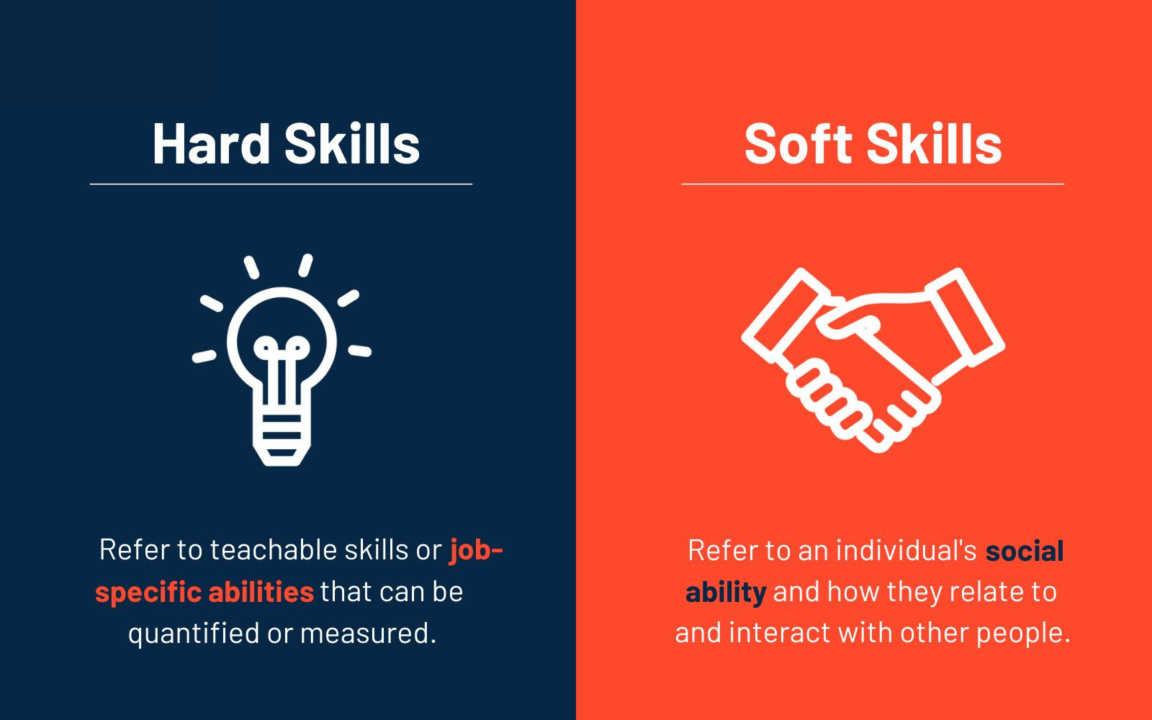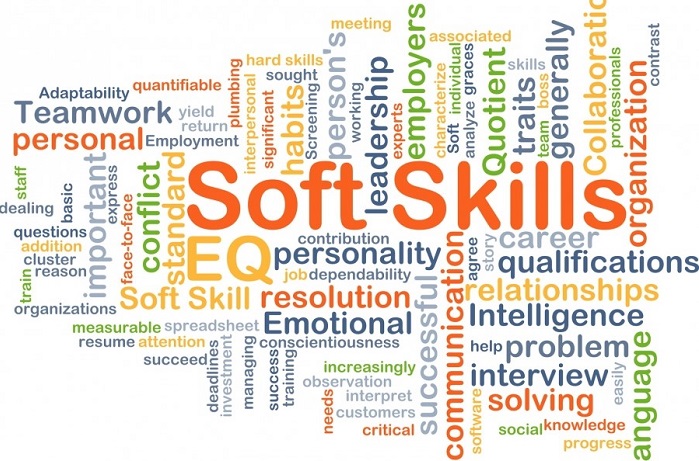In today’s rapidly evolving professional landscape, technology will continue to revolutionize the workforce but one thing for certain is that business will forever remain a human endeavor reliant on strong relationships for success. Regardless of whether one is introverted or extroverted, interaction with others is inevitable. This is where soft skills come into the picture. Soft skills encompass a blend of people skills, social aptitude, communication prowess, emotional intelligence, and personality traits that facilitate effective collaboration and cohesive work dynamics.
These skills hold immense value across all industries, workplaces, and positions, enabling individuals to contribute as productive team members. Employers actively seek candidates proficient in soft skills alongside hard skills and technical expertise therefore, understanding what soft skills are can help you identify and improve upon your own, helping you become a more well-rounded candidate and employee. So what exactly are soft skills? And why are they so important to growing your career?
Soft skills vs. hard skills

Hard skills typically refer to technical competencies and specialized knowledge pertinent to a particular field or profession. These skills are tangible, quantifiable, and often acquired through formal education or on-the-job experience. Conversely, soft skills are more nuanced and intangible, focusing on interpersonal interactions, emotional intelligence, and adaptability.
These skills are not an exact science but they’re just as impactful. Certain soft skills may also be inherent aspects of your personality or work ethic making them inherently transferable across different roles and industries and are necessary at every level of the workplace, from entry-level roles to top-level executives.
While hard skills are undoubtedly valuable, it’s the combination of soft and hard skills that truly propels individuals toward professional success. In fact, soft skills are becoming more critical. You might be great at your profession, but if you can’t work well with others, you won’t get very far. Research findings from Harvard University, the Carnegie Foundation, and the Stanford Research Center consistently highlight that a significant 85% of job success stems from the development of robust interpersonal skills. Whereas, technical skills and knowledge contribute merely 15% to the overall equation of job success.
The importance of soft skills and how they can be developed
According to a study conducted by Leadership IQ, a renowned global leadership training and research company, 46% of newly hired employees are reported to fail within 18 months of employment. The primary cause behind this alarming trend is poor interpersonal skills. Soft skills facilitate effective communication, collaboration, and conflict resolution, fostering a conducive work environment where individuals thrive and businesses flourish. As you advance in your career, the significance of soft skills becomes increasingly apparent. Mastering these skills early on lays a solid foundation for transitioning from an individual contributor to a managerial role. Furthermore, continuously developing these skills can boost your leadership capabilities, empowering you to inspire and lead your team effectively.
Soft skills are dependent upon intangible facts and therefore require situational awareness to know when to use which skill. Developing soft skills is not merely a matter of innate talent, but rather a journey of continuous learning and refinement.
The key to enhancing your soft skills lies in cultivating genuine concern for others. Other ways you can hone your soft skills include:
- Seeking feedback: Solicit feedback from colleagues, mentors, and supervisors to gain valuable insights into areas for improvement and growth.
- Practicing self-reflection: Take time to reflect on your interactions, strengths, and areas of development, this will foster greater self-awareness and personal growth.
- Step out of your comfort zone: Challenge yourself to take on new responsibilities, projects, or leadership roles that stretch your abilities and foster personal growth.
- Embrace learning opportunities: Participate in workshops, seminars, and online courses focused on communication, emotional intelligence, and other soft skills.

7 Soft skills to master for professional success

Emotional intelligence
Emotional intelligence encompasses self-awareness, empathy, and the ability to manage emotions effectively. By understanding your own emotions and those of others, you can navigate interpersonal relationships with empathy, resolve conflicts constructively, and inspire trust and confidence in your colleagues. Take this quiz by Harvard Business Review to assess your emotional intelligence and identify areas you can improve.
Effective communication skills
Effective communication lies at the heart of every successful professional endeavor. Whether verbal or written, the ability to convey ideas clearly and persuasively fosters collaboration, mitigates misunderstandings, and strengthens professional relationships. Furthermore, you need great communication skills to:
- Nurture long-term relationships
- Delegate clearly
- Deal with a variety of personalities
Adaptability
In today’s dynamic and rapidly changing work environments, adaptability is key to thriving amidst uncertainty. Embrace change, remain flexible in your approach, and demonstrate resilience in the face of challenges to seize new opportunities and stay ahead of the curve. Employers value this skill because it shows that you are dedicated to always improving.
Critical thinking skills
Critical thinking is the ability to analyze information objectively, evaluate arguments, and make reasoned judgments. By honing your critical thinking skills, you can assess situations thoughtfully, identify underlying assumptions, and make informed decisions that contribute to problem-solving and strategic planning.
This skill is exceptionally valuable for making critical decisions and solving complex problems. Employers therefore actively seek candidates possessing this ability to promote growth and improve company-wide processes on a broader scale.
Team player attitude
Being a team player involves collaborating effectively with others, supporting team goals, and creating a positive work environment. Whether you’re an individual contributor or a people manager, collaboration with others on various projects within a company is unavoidable. Therefore, cultivating a positive, can-do attitude toward teamwork is crucial for promoting team harmony.
Conflict resolution skills
Conflicts are inevitable in any workplace, but adept conflict resolution skills can transform challenges into opportunities for growth. Effective conflict resolution involves active listening, empathy, and a commitment to finding mutually beneficial solutions. Ultimately, mastering the art of conflict resolution can enhance your team’s relationships and productivity.
Time management
Time is a precious resource, and effective time management is essential for maximizing productivity and achieving work-life balance. Learning how to Prioritize tasks, set realistic goals, and develop strategies to optimize your workflow ensures that you can meet deadlines and deliver results consistently.
While hard skills may get your foot in the door, it’s soft skills that pave the path to long-term professional success and fulfillment. By prioritizing the development of these essential attributes, you can position yourself as a valuable asset to any organization, empower yourself to navigate the complexities of the modern workplace, and chart a course towards a rewarding and impactful career.

